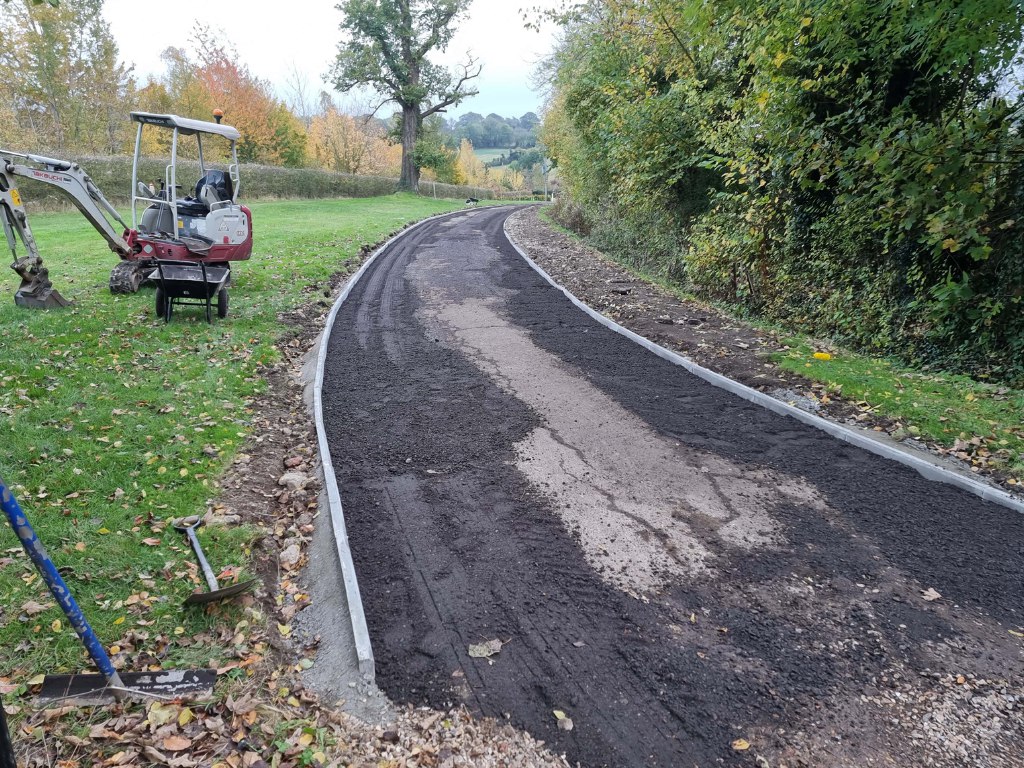Why Agricultural Tarmac Roads Are Built to Withstand the Toughest Conditions
Agricultural roads play a crucial role in farming operations, providing essential access for heavy machinery, livestock, and transport vehicles. Unlike standard roadways, farm roads must endure extreme conditions, including high vehicle loads, constant wear, and exposure to the elements. Tarmac is one of the most reliable materials for agricultural roads, offering durability, cost-effectiveness, and long-term performance.
The Unique Challenges of Agricultural Roads
1. Heavy Traffic and Machinery Use
Farm roads experience far greater strain than residential driveways or standard rural lanes. Agricultural tarmac roads must be built to support:
- Tractors, combine harvesters, and trailers, which exert intense pressure on the surface.
- Frequent traffic movement, often concentrated in specific seasons, such as planting and harvest periods.
- Livestock and equipment transport, requiring smooth, even surfaces for safe operation.
A poorly constructed surface can quickly deteriorate under these conditions, leading to potholes, rutting, and structural failure.
2. Harsh Weather Conditions
Farm roads are exposed to the full force of the elements year-round, making weather resistance a critical factor in their construction.
- Heavy rainfall can lead to surface erosion and pooling water, weakening the foundation.
- Frost and extreme temperature fluctuations cause expansion and contraction, leading to cracks.
- Drought conditions can dry out the ground beneath, affecting stability.
Tarmac’s ability to flex under temperature changes and drain water effectively makes it ideal for these conditions.
3. Soil and Drainage Considerations
Agricultural roads are often built on uneven or unstable ground, requiring proper preparation to prevent future issues. Key considerations include:
- Drainage systems to prevent waterlogging and surface damage.
- Strong sub-base layers to provide stability and prevent movement.
- Surface grading to encourage runoff and reduce standing water.
Without these measures, even the strongest materials can deteriorate quickly.
Why Tarmac Is the Best Choice for Agricultural Roads
1. Exceptional Durability and Strength
Tarmac is designed to withstand heavy loads and frequent use, making it an ideal material for farm roads. Its key advantages include:
- High load-bearing capacity, preventing cracks and rutting.
- Resistance to shifting and settling, maintaining a smooth, even surface.
- Long lifespan, reducing the need for frequent repairs.
With proper installation, a tarmac farm road can remain in excellent condition for decades.
2. Cost-Effective and Low Maintenance
Tarmac offers long-term savings compared to other surfacing options.
- Lower initial installation costs than concrete.
- Minimal upkeep, requiring only periodic inspections and minor repairs.
- Easy resurfacing, allowing worn areas to be restored without full replacement.
This makes tarmac a practical investment for farms looking for reliable and cost-efficient road solutions.
3. Weather and Water Resistance
Tarmac’s weather-resistant properties make it particularly well-suited for farm environments.
- Quick drainage prevents water pooling and erosion.
- Flexible material structure minimises damage from frost heave and expansion.
- Non-porous surface reduces the risk of weed growth and surface degradation.
These characteristics ensure that agricultural roads remain functional and safe throughout the year.
4. Smooth and Safe Surface for Vehicles and Livestock
A well-constructed tarmac surface improves efficiency and safety on the farm.
- Reduced vehicle wear and tear by minimising bumps and ruts.
- Safer transport of livestock and goods due to stable, skid-resistant surfaces.
- Easier access in all weather conditions, ensuring uninterrupted farm operations.
Compared to gravel or dirt tracks, tarmac offers superior ease of use for both machinery and daily farm activities.
Conclusion
Agricultural tarmac roads are designed to endure the toughest conditions, providing farmers with a durable, cost-effective, and weather-resistant surface. By investing in high-quality materials and proper installation, farms can ensure safe and efficient transport for machinery, livestock, and produce.
For expert agricultural road surfacing in Soham, Cambridgeshire, our team offers professional tarmac solutions tailored to withstand the demands of farm life. Contact us today to discuss your project and get expert advice on the best approach for your farm roads.
Call us on: 01353 881 093
Click here to find out more about Soham Driveways
Click here to complete our contact form and see how we can help with your driveway needs.

